#force analysis
Text
The thing about the Gray Jedi that doesn’t work is that you can’t be 50/50, that’s not how the Force works.
The Force is an incredibly simple magic system, honestly. Good people (Jedi) gain Good People Powers through working on themselves and helping people, and bad people (Sith) gain Bad People Powers by making themselves miserable and hurting everyone around them.
You cannot be a good person and have Bad People Powers like Force Lightning or whatever because those powers literally come from causing and exploiting people’s suffering. The Gray Jedi just don’t work because the Force is a dichotomy. There is the the Dark Side and the Light Side. You cannot be both, and if you could, well, being 50% evil is not a good thing, actually.
At best, you get something like the Bendu from Rebels where he’s just like, the worst kind of bystander. He has a ton of power and strength and he refuses to use it for anything, he lets everyone else be miserable, he lets the world get worse because he refuses to pick a side in a world that demands he have one. And at worst, you get Anakin Skywalker in RotS who is flip-flopping between light and dark, killing an unarmed prisoner one moment and risking his life and the Chancellor’s to save Obi-Wan the next. You get someone desperately unstable and uncontrollable who lashes out randomly and extremely destructively, pulling himself deeper into the Dark because he refused to choose a damn side.
Being 50% evil is either a step towards being 100% evil or it’s just… nothing. Utter passivity, refusal to do anything because it disrupts the ‘balance’ that never actually existed because good and evil are not equal. There’s no real nuance there, it’s a simple magic system, but that’s because it was made for kids! Look it up, GL has said all this before.
Anyway, yeah, being half evil kind of inherently precludes you from being a good person.
#like god it’s not that deep at all#it’s a morality based magic system!#the good people are Light the bad people are Dark that’s as classic and obvious as you can get#star wars#the force#force meta#force analysis#gray Jedi#anti gray jedi#bendu#sw#sw meta#sw analysis#jedi#sith
114 notes
·
View notes
Text
The Feelings Of The Average Israeli Occupational Soldier: A Quick Analysis By James Ray
If you haven't already, follow him on tiktok. (@jamesgetspolitical) He gives constant updates on the genocide in Palestine but also offers food for thought in his content.
Free Palestine, End The Occupation🇵🇸‼️
#free palestine#gaza#palestine#free gaza#from the river to the sea palestine will be free#pray for palestine#media analysis#facism#israeli soldiers#israel terrorist forces#israel is committing genocide#genocide#facists#israel#ceasefire#permanent ceasefire#america#usa
8K notes
·
View notes
Text
Hallucination of Tim hugging Jason
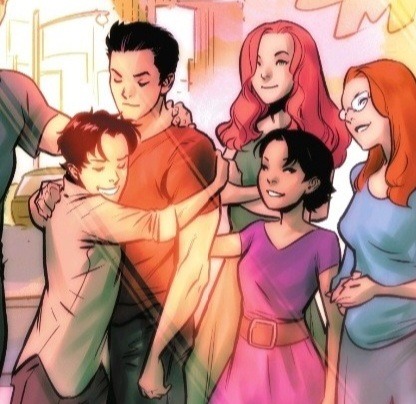
Damian hugging Jason as a diversion
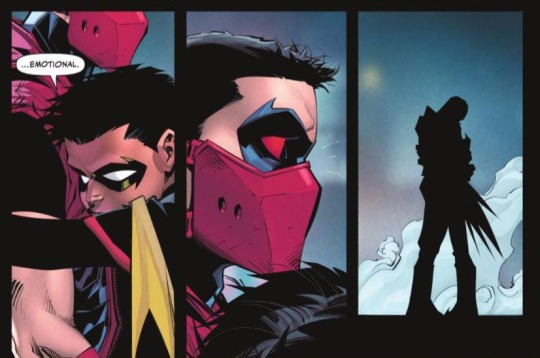
Jason and Steph having a real hug
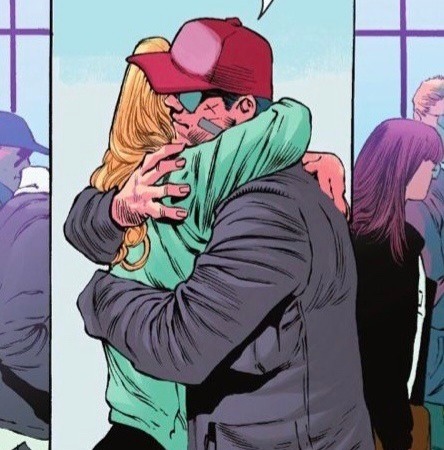
#dc#dc comics#comics#comic books#batman urban legends#robin 2021#task force z#jason todd#red hood#tim drake#red robin#damian wayne#robin#stephanie brown#spoiler#batfam#batfamily#batkids#robins#media analysis#character analysis#jason peter todd#comic panels#character dynamics#parallels#comic analysis
5K notes
·
View notes
Text
Behind the jokes and badassness, Captain Marvel is a fascinating character to me, because of how death follows her.
She causes an explosion. That explosion, which gives her powers and her immortality, canonically kills her. The Kree Empire resurrects her and makes her as Kree as they can. She shares Yon-Rogg's blood and his life, she's his creation, she's his victim, she's the one who causes his downfall, she's the one that destroys the system, the society, the planet that allowed her to be abused.
It's the Kree that see her as a killer and Annihilator. She's a monster of their own making, but it influences every species and planet she touches. Her victories cause death and her mistakes cause more death. Carol's triumph, the death of the Supreme Intelligence, results in the death of probably millions of Kree, and by consequence, almost causes the death of Hala's star.
"I'm only human" Carol says, before killing the Empire that is the reason that she can't ever be human again.
"We'll be back for the weapon," Ronan says, but that weapon will kill everything he stands for.
"Your life began the day it nearly ended," The Supreme Intelligence says, coldly, calculatingly. It's an AI. It doesn't have a good concept of death. It doesn't fully grasp that Carol had genuinely been killed that day, because she's still in front of it. Carol kills it.
"Death seems to follow you," Dar-Benn says, before she causes an explosion with the bangles, trying to defeat Carol. The explosion kills Dar-Benn.
Death follows Carol. Death follows Carol! Mar-Vell is dead. Maria is dead. Talos is dead. Soren is dead. Ronan is dead. Minn-Erva is dead. Korath is dead. Dar-Benn is dead. Yon-Rogg is, probably, dead. The Supreme Intelligence is dead. Natasha is dead. Tony is dead.
The only people in Carol's life who aren't dead are Kamala, Monica, Yan, Valkyrie, and Fury.
She watches helplessly as Dar-Benn almost murders Kamala after Kamala tries to save Dar-Benn's life, tries to find a way to solve the violence without death.
She watches helplessly as Monica gets torn into another reality, which for all she knows, she could die in. The tear in reality that was caused by Dar-Benn's death.
She tries to hide Yan's existence from her friends and tries to warn him and his people. The Kree soldiers aren't fighting to maim, they're fighting to kill. He escapes death by his own fighting skills and the fact that the Kree would rather focus on killing Carol than him.
Valkyrie and Carol interact once, and she only calls when she needs help after a fight, not during. Think about it. Valkyrie and the Bifrost could have helped the trio enormously. But Carol doesn't call until the fights are over. It would be very easy for a regular Asgardian warrior to die compared to superhumans.
And Fury... have you seen how often Fury comes close to dying? He's alive from skill and luck. He is lucky that he isn't dead.
Captain Marvel is so, so fascinating. Her story begins with her own death, and the more it goes on, the more death happens around her. Nobody is safe. She causes almost all of them, even the ones of her friends - not directly, but through the consequences of her actions. The consequences of her victories and mistakes. The consequences of her anger and revenge, her power and powerlessness. It is caused by both the Human and Kree sides of her, by both Carol and Vers, Captain Marvel and the Annihilator.
Carol is immortal. She can't die. And death follows her anyway.
#captain marvel#carol danvers#the marvels#the marvels 2023#the marvels spoilers#marvel#mcu#marvel cinematic universe#kamala khan#monica rambeau#dar-benn#nick fury#kree species#character analysis#its my *blorbo* and *i* get to be insane about her#im going to need an avengers level security force protecting kamala from now on#yon-rogg#character study#rambling#does this make sense? no and idgaf#death mention#1k#hitposttag
2K notes
·
View notes
Note
I ABSOLUTELY ADORE YOUR SQQ HE LOOKS SO FUCKINH DONE WITH LIFE

The recipe for SQQ is: calm on the outside, screaming on the inside.
#poorly drawn svsss#svsss#shen qingqiu#ask#No joke I'm pretty sure he is my favourite 'guy gets transporte'd to another world' character#I recently rewatched the (sadly never to be continued) animated version of SVSSS and I cant get over how perfect he is for the role#He is *so* done with everything going on around him. Forced to be calm and mean. Born to scream and be kind.#The gap between the internal and external dialogue is one of my fav character/writing quirks.#The personification of the 'he lied' dialogue tag.#Love how deep the SVSSS meta and literary analysis community gets with him. Piosplayhouse has opened my eyes to trans SQQ#what is the system is *not* a metaphor for pressure to adhere to societal norms of gender and sexuality?#I really need to finish the books...that is probably my biggest burning hole in my 'DNF' pile. I liked it! I just got busy.
1K notes
·
View notes
Text
of course you can read necros and cavs as a parallel to the gender binary bc A) you can do whatever you want forever and B) yeah there's plenty of textual evidence comparing the necro-cav bond to a marriage. however one thing i think many of these discussions keep missing is the fact that most people in the nine houses are not necros or cavs and do in fact exist outside of this binary. which would make it. not really much of a binary
#get ur warm takes here#i know other people have said this already but i really feel like this binary idea has proliferated recently#but i get it i mean in the books we have almost zero exposure to House citizens living outside this 'binary'#so it is a binary in the sense that you can apply it to our major characters who are from the nine houses#but i'm just not sure about extrapolating it to the whole fictional society#i do think there are comparisons to be drawn here i just don't think enough discussions account for this third group being most of#the population.#like do a thematic analysis for sure but personally i would stop short of saying 'joh created a new gender binary and forced everyone into#it' bc. what about all those other offscreen characters who are neither necro nor cav#the locked tomb#nonasbirthday
1K notes
·
View notes
Text
Sonic’s been more acceptable to hugs in canon. Specifically with Tangled and Amy. He also has small examples with the Wisps as well. It makes me think after Sonic Forces where Sonic’s had no contact with ANYONE for 6 months, he’s grown to like hugs A LOT more.
Before Sonic Forces:
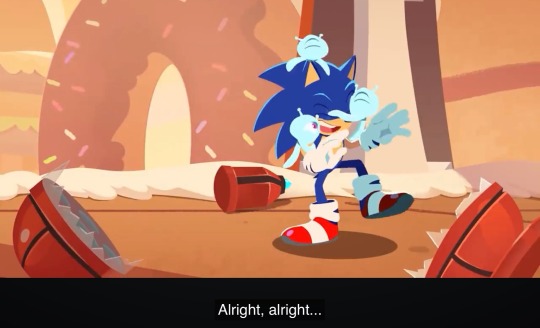


After Sonic Forces:
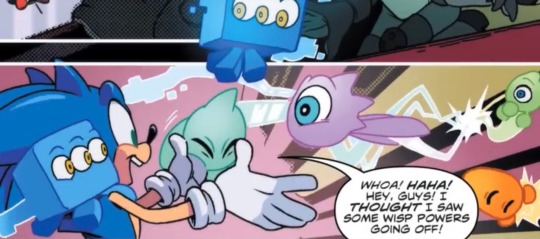


Before Forces Sonic politely pushes the Wisps away from him for some personal space. While after Forces he greets them with open arms. This gives off the impression after disasters like the metal virus or Frontiers where Sonic couldn’t even high-five his friends, the blue hedgehog grew to be more physically affectionate towards his friends. I guess Sonic decided it was something he wanted to appreciate while he’s able to.
Makes you really wonder how those obstacles might’ve permanently affected him. To be fair those situations including the one with Surge, did a total number on the guy in some fashion. We were told about it more then shown in Forces but it still counts.
Or maybe I’m looking WAY too much into things. It’s your call!
#sonic the hedgehog#tangle the lemur#amy rose#surge the tenrec#sonic colors#Sonic rise of the wisps#sonic forces#sonic idw#sonic frontiers#character analysis#sth
470 notes
·
View notes
Text
okay. i mean this with the utmost affection. but. while imogen and laudna telling each other "im you're anchor. you're my tether" as reassurance about going "dark" or giving into the lure of power is very meaningful and important. it also kind of struck me like. hey wait one of you anchoring the other. fine. possibly-functional. but doesnt BOTH of you tethering to each other risk creation of a spinning centrifugal blur whirling down the road to power.
and like yes yes this isnt an original thought and the proper terminology for this is probably like "dual corruption arc" or in CR "i broke the world for you" yes but. i wanted to share the specific imagery my brain provided for this train of thought, which is roughly:
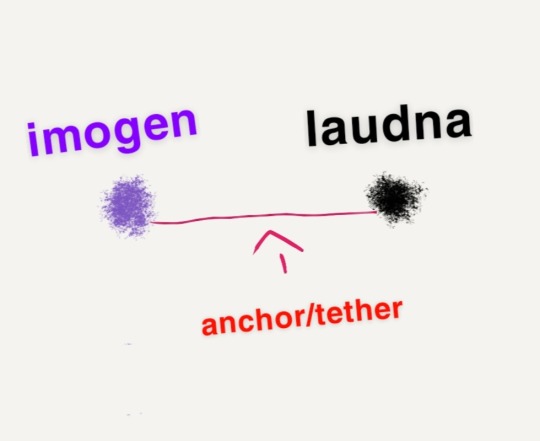
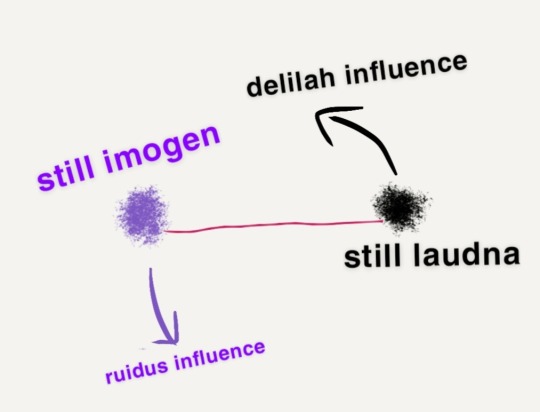
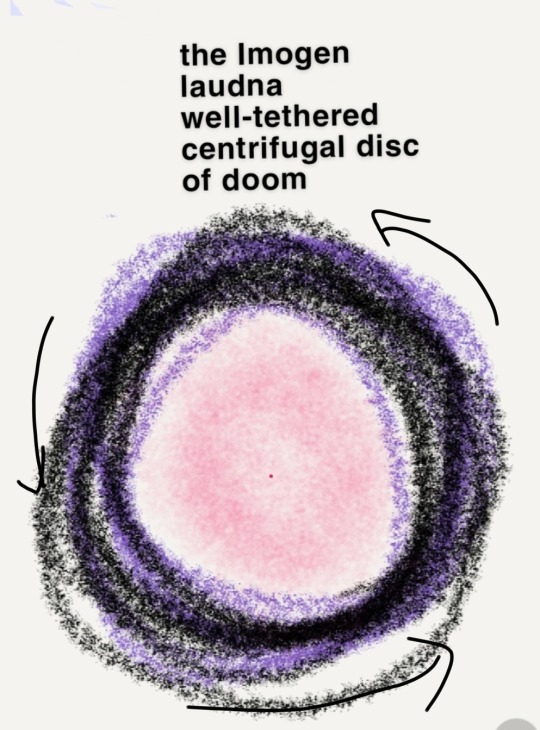
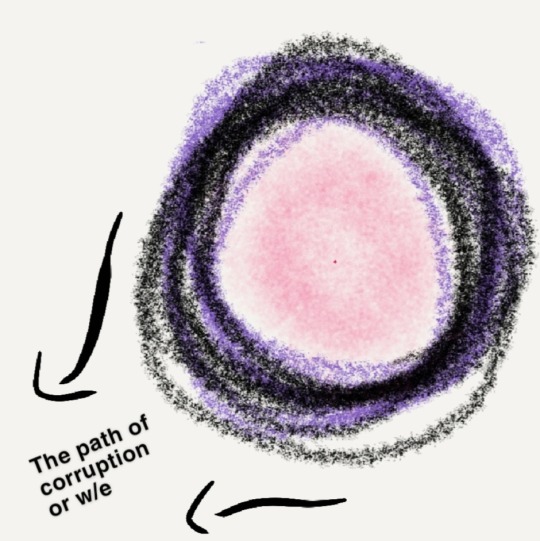
like. thanks. brain. i guess.
bonus thought that popped up when drawing this:
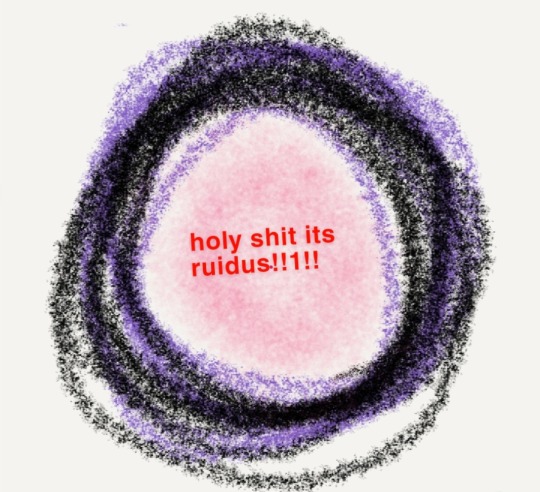
#critical role#imogen temult#laudna#c3e65#cr spoilers#kinda#sorcery pact#LOOK I CAN ABSOLUTELY WRITE MORE THOUGHTFUL IN DEPTH ANALYSIS OF THIS or i can illustrate this and giggle at it#orbs spin fast. hah.#:)#(once i watch. proper meta is coming. this is both a promise and a threat)#i was partway thru making this post when i lost signal for a while and had to ask someone around me whether centrifugal is the outward forc#and couldnt explain why i was asking#the sacrifices i make for cr......#shitpost#spar speaks#imodna#.....?
1K notes
·
View notes
Text
Analysis of the romance in Death Note's Spiraling Trap game.
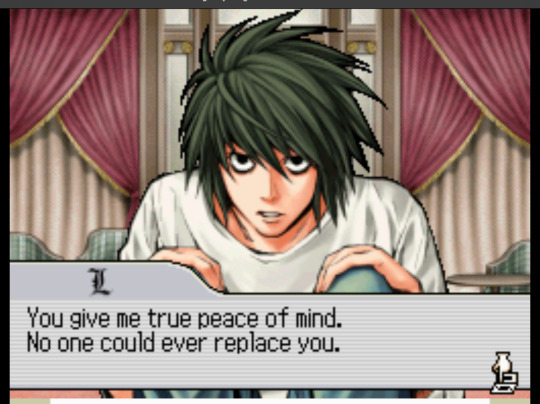
EDIT 02/03/2024: minor edits and fixes, added a few imgs and extra content.
A huge thank you to the folks over at agtteam who translated L - the ProLogue to Death Note: Spiraling Trap into English! Now we can all date L become FBI agents after hours.
I've been playing the game recently and one of the features I love the most is the L Communicator, which allows the main character (referred to as MC henceforth) to take a break from adventuring and listen to L talk about whatever is on his mind.
There's around one hundred different lines available as the MC develops a relationship with L and they paint him as such a sweet, attentive and thoroughly unique individual that I was surprised by how detailed it was. If you're thinking about playing, then this part is definitely worth putting effort into.
The mechanics of the dating sim are relatively simple: during the adventure, you'll pick up a number of recipes hidden among traps and tools. Then, Watari will provide the ingredients and you can give L whatever sweets he specifically craves. These recipes and cravings depend on the time of day and can be season specific.
Character analysis
As stated in-game, giving L sweets causes his appreciation for the MC to grow. However, L being L, means that he craves different sweets throughout the day. He's definitely very specific about what he likes and what he wants for his sugar fix.
However, if you give L something he isn't craving at that specific moment, he will sulk. The way he expresses his displeasure varies according to the depth of the budding relationship he has with the MC.
L: To tell you the truth, there are many other things I would have preferred.
L: [F/N], I hate to say this, but I really would have preferred something else.
L: F/N], you must know that I was hoping for something else, right?
L: [F/N]… It’s not my favorite but, it made me really happy.
Note: Given that the books in the expanded universe (Another Note and L: Change the WorLd) came out before this game, I think some of the quotes further ahead might be a subtle nod to how L is perceived by the police forces as the "creepy murder detective". However, references about his piece of mind lead me to believe that L craves some respite from the burdens he carries on his shoulders — burdens so strong that they managed to curve his spine.
Note: I'm unsure how the system here works, as the MC also gets points for gaining L's trust in the actual adventure when they a) agree with his observations and b) find key objects hidden in unsuspecting places. It might affect the available lines through the L Communicator.
L: Today is going to be a better day… Let’s think positive.
L: I wonder what kind of morning this will be.
L: It seems the air outside is crisp this morning.
L: I want to finish what I need to get done before night falls.
L: It’s nearly sunset. Time for children to go back home.
L: If you just stare into space, night will be here before you know it.
L: It’s already evening… Time keeps passing me by.
L: There’s something different about the air at night.
L: Night-time, dusk… It’s the witching hour.
As a naturally introspective individual, L observes the world around him and draws conclusions. To my surprise, the game actually managed to capture how observant L is about small, unsuspecting details of daily life and give him a slightly poetic side laced with a hint of wistfulness that suits his character well.
This is a side of L in his private life that I personally wish we had been able to glimpse during the Kira investigation. Though, at the time, L was busy trying to prove that Light was, indeed, Kira. It left him little to no time to enjoy the world around him. During the brief time that L could have had a semblance of rest right before the Yotsuba arc, he was depressed that his deductions were "wrong" — though I could see him musing about some of the above, equal parts whimsy and sulking.
L: If I start to lose my touch… I guess I’ll retire.
L: Another day, another mystery…
L: I have a lot of thinking to do.
L: I feel like doing some capoeira…
L: I haven't played tennis for a while.
L: The weather today is… Well, it matters not.
L: I, um… No, ignore me.
L: Am I reading too much into it…?
As a thinker, L has a lot of unfinished thoughts he says out loud. Some border on cliché, others are musings about things he'd like to do or that he's missing.
I wonder if some of his thoughts end up trailing off because, suddenly, he catches himself and believes they're not important? Or that he doesn't think the MC would be interested in what he has to say beyond work matters?
L: “In spring one sleeps a sleep that knows no dawn.” Though, too much sleep isn’t good for anyone.
L: If you think about things persistently, noticing all the sides to them will come naturally.
L: Strawberries… Despite the name, they aren’t actually berries. How berry disappointing.
L: The one who has thought it through wins. It’s true for chess, and for deduction. But in the case of love… I don't know.
He's also a philosopher at heart, always thinking about the human condition. In these we can also witness his dry humour, silly puns along with a subtle desire to share his thoughts on the world and give helpful advice.
As for love, L is cautious but willing to learn. It's a topic where he's out of his depth.
L: Um, Watari is…
L: I wonder if Watari’s asleep?
L: What could Watari be up to?
L: Today is Thanksgiving Day. I am truly grateful to Watari for his diligence.
I found it interesting how L's thoughts eventually go back to Watari and what he's doing. He's the one person that L relies on and whom he interacts with the most. Other people are passing acquaintances at best, who show little interest in L beyond work.
Notice how he mentions diligence? Although it is a utilitarian consideration, it also reveals a thankfulness for the comforts of familiarity and the peace of mind that trusting someone close brings. This is a topic we'll explore better at a later stage, i.e., how trust and acts of service work as a relationship builder.
Romance
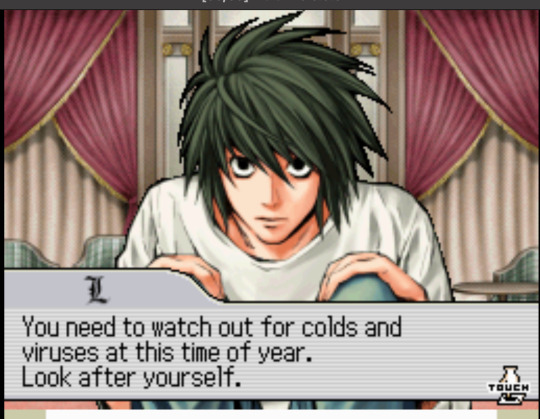
Neutral stage
One of the first things I've noticed is that, during the early stages of the relationship, L is still very formal and quite a bit dismissive — even borderline rude. As his sugar fix gets sated by the MC's keen suggestions (Watari provides the ingredients, of course), L grows gradually more fond of them and wants to include the MC in his life with an enthusiasm I can only define as endearing.
L: Aren’t you bored? You don’t have to check in on me.
L: Don’t you have stuff to do?
At the beginning, L is still wary of the MC on a personal level as they have absolutely no rapport beyond a partnership of circumstance and usefulness in the name of justice. He's quick to get bored and doesn't take it very well when he's given sweets he isn't craving. A bit childish, one could say, the way he sulks when the MC errs by not reading his mind.
L: Did I enjoy it? Let me just say “no comment”. (about sweets that weren't quite to his taste)
It's also very in-character for L to feel both annoyed at someone who is randomly calling him and be suspicious of their motives.

Growing interest
L: Spending the afternoon with you isn’t so bad.
L: Even though it’s late, you’re not going to bed, huh?
L: You must be a night owl, [F/N].
L: I’m a little curious about you, [F/N].
L: Are you having a good time? I’m just curious.
L: You’re kind of… Ah, no, forget I said anything.
He starts addressing the MC by their first name as he becomes more enamoured. It's very sweet. I was pleasantly surprised at how attentive L becomes as he gradually comes to the conclusion that this is a person who understands him.
Mind, due to game mechanics the MC gains approval by giving L sweets, but from a narrative perspective what's really happening is that L not only feels seen and understood, but also accepted. And when that happens, he starts lowering his walls and relaxing.
As a plot device, I would say these are defining moments within L's thought process here; he's curious about the MC, finds them interesting enough to want to know more them and pursues that curiosity to see what they might have in common. It seems he's both a little baffled and content about this development.
L: [F/N], what do you think of when you see a sunset?
L: What are you doing this afternoon? Oh, should I not have asked?
L: Are you a night owl? Oh, you don’t have to answer if you don’t want.
It should also be noted that L is very mindful of boundaries. There's a tentative, almost shy attempt to connect. He's determined to indulge in his curiosity since the MC's attentiveness towards him shows an opening for closeness he's unused to (but is happy about) and to tend to his more immediate needs (i.e., food cravings), which in turn shows a genuine concern for him. Aside from Watari, I doubt anyone ever extended L similar kindness.
And it is in this determination to get to know the MC that I also find Mello's words (AA: LABB Murder Cases) that L is actually a very active, aggressive individual with absolutely no interest in social conventions perfectly represent him this game, as he navigates a growing fondness with expectation, curiosity and caution — on his own terms, while minding that he doesn't overstep.
L: Staying up late talking to you… It makes me feel calm.
I find it particularly heartbreaking how this confession of L unknowingly makes it more transparent how burdened he is. The spine curved by burdens unseen, the addiction to mind games and sweets; all of these point to stress factors which isolate him further, increasing the loneliness and lack of affection in his life.
That L feels the need to mention the MC makes him feel calm seems telling.
L: We’re both late workers, huh? That makes me happy.
L: [F/N]… You’re pretty formidable.
L: It’s reassuring to have a partner like you. You’re someone I can trust.
L: Your feelings have been received. (Valentine's Day)
L: The fact we’ve become so close was an unexpected development on my part.
And here it is, the acknowledgement just as L enters the highest stages of approval, where he expresses admiration and happiness at the close bond he developed with the MC.
"An unexpected development on my part" is quite the turn of phrase. One can only wonder, but I'd make an educated guess that L didn't see this coming because:
a) no one showed feelings towards him before.
In his line of work, hidden behind a screen there is no time to indulge or get attached to anyone (he would mistrust their intentions anyway) and so L keeps everyone at arms length, sharing little more than a professional side of himself and fostering utilitarian relationships that help him win "games". L ultimately carries various burdens the average civilian would never be able to understand, all due to the pressure of his job. When failing at the "game of cat and mouse" means being responsible for the likely deaths of dozens, perhaps even hundreds or thousands, the stakes are up in unimaginable ways. What started as a thrill chase can have catastrophic consequences should L fail. That in itself alienates him from society at large.
It's a game that L plays well and absolutely profits from, but it is also an indicative of two major flaws: his addictive personality and how he suppresses his emotions to carry on. Coincidentally, it's the expanded universe, in particular Another Note: LA BB Murder Case and L: Change the WorLd, that give us the best insight into this.
This isn't too dissimilar to the struggles policemen face in high risk jobs or technicians who have to flag and delete sensitive content from online platforms. These people end up changed from what they see — and some carry traumas for the rest of their lives.
That's not to say that L doesn't feel for others. He respects people whom he considers good or morally upstanding (Soichiro Yagami), who are competent in their line of work (Naomi Misora, Mogi), worthy of a second chance (Aiber and Wedy), who speak their minds, unafraid (Aizawa) or who are reliable, loyal to him as a person and not just his cause, in whom he can place his trust and feel secure won't betray him (Watari).
The MC seems to fall mostly in the last category, though the relationship is rather precocious — and there seems to be a fair amount of wishful thinking and even projecting on L's part, since communication happens over a device connecting two people remotely. He falls both for the idea of the individual and their attentiveness towards him.
When L mentions that they make him feel calm, I'd argue it comes both as a surprise to him and a confession of a closeness and safety he intimately craved — though I personally view L as someone who feels lonely and wanting healthy human contact, even if his social skills might not be the best (worsened by his distrust of people as a whole). Someone who ultimately is willing to adapt to him but whom he can adapt to, as well. Someone who sees him as a person and not an unfeeling robot.
It's a POV that certainly challenges certain aspects of DN: Vol 13. I would further argue that L's portrayal has evolved significantly beyond the manga, and that his subsequent humanising is partially a result of the creative liberties the English translations took, as well as a more empathetic view of the character and hidden struggles. Each medium displays a separate iteration of L, with common variables.
b) L fosters distant relationships with others as a safety measure.
Aside from Watari, L's contact with other people had always been distant, work-focused, perhaps even tainted by notions of his supposed creepiness as a kinky detective "who relished bizarre murders" (L:CtW). He's useful to the police because he achieves favourable results, though L is still viewed as "a human computer, capable only of measuring mass murders in terms of cold numbers, a reclusive sociopath" (L:CtW). He isn't necessarily liked; in fact, I would argue he rubs people the wrong way most of the time — as we can see during his interactions with the Task Force, during the events of Death Note. L is tolerated, a useful asset who is both mysterious and a pain to deal with.
However, he's also put on a pedestal due to his status (i.e., Relight, the children at Wammy's).
For the latter, he purposely shatters their idea of L as this unbeatable, paragon of justice by defining himself as a monster (anime), a dishonest cheating human being who hates losing (manga). I do share in lux-mea-lex's perspective on L doubting his own humanity and how it fuels a certain self-hatred for distrusting everyone around him. As lux mentions, "love comes with trust" and L is an excellent detective precisely because he questions everything and everyone — but it comes at a cost: his own loneliness.
To draw a parallel, L's ultimate flaw — and that which makes him great at his job — is not unlike what we see during the moments of extreme anguish that Veronica Mars goes through in her personal relationships and which draw people away from her when she oversteps boundaries to prove she's not being lied to. That mistrust comes from experience, for people burdened with having seen too much and it's not unlike a kind of paranoia acquired when one has to deal with the worst of humanity on a daily basis.
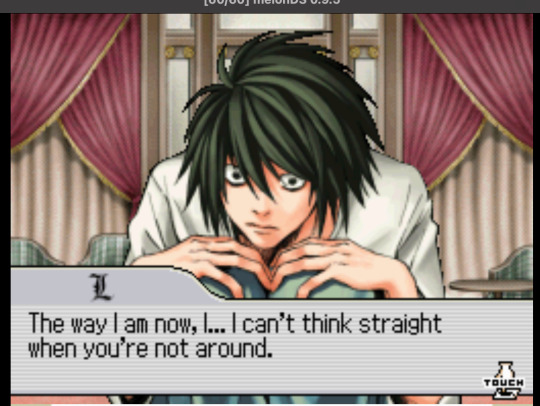
Full reciprocity
L: [F/N] you’re the light that illuminates the dark night. That’s an exaggeration of course, but…
L: What I need to live is glucose… and to talk to you. Nourishment for my brain and heart.
L: When we’re together, I feel like there’s no problem we can’t solve.
L: The afternoons I get to spend with you are precious to me.
When the MC achieves the stage of full reciprocity with L, he's very open to showing vulnerability and lowering his emotional defenses. I found this to be particularly sweet, as L is such a secretive man with so many hidden layers that him being willing to show such honesty with that one person he holds dear is incredible character development.
Beyond the game, I would say that achieving this stage with L would be much more difficult and, naturally, would involve going beyond picking the best sweets for him.
Something important to keep in mind is that L seems to value acts of service, as the people who interact with him more closely have some utility value and aid his work. However, L's life revolves around his work; he lives and breathes his detective work, which is why having a partner who brings him peace would be so important.
L: The time I spend with you is as important to me as the sweets.
L: Good morning. It makes me really happy to see you here.
L: For your sake… I’d think of a way to get through anything. We share a bond.
L: When you have time, I’d like to take you to a shop that makes the best sweets.
L: When you’re free, how about we play tennis together? I will have Watari reserve a court.
L: If something were to happen to me… I want you, as the person I hold dearest, to carry on the L moniker.
L: When my thoughts hit a dead end late at night, I feel like I’m stuck in a maze. But, having you here makes me feel reassured.
I also found it very sweet how L takes the initiative to plan for activities to do together with the MC. And how their presence, their reassuring words make him feel at ease. It seems that a loving relationship would give L a goal in life beyond his work.
Carrying on the L moniker... this quote might be the result of L's trust in the MC growing during the events of the game, or a sentiment L nurtures due to the MC being attentive enough to understand his specific cravings. But being able to read L and having the mental dexterity to become him are different things, as the latter involves a lifestyle that few would want and a complete focus on work. Even FBI agents have lives beyond work.
L: I learned from you that sweets are the bond that brings people together.
L: You give me true peace of mind. No one could ever replace you.
L: The way I am now, I… I can’t think straight when you’re not around.
L: Being able to share this sunset with you, I couldn’t ask for anything more.
L: You understand, don’t you [F/N]? What my heart so strongly desires is something more…
L: When I talk to you, I feel like my senses are sharpened. Thanks to that, my radar has become more sensitive.
What a sweet guy. I love how L focuses on the little things and just wants to spend time together with the person he holds dearest. It's almost as if he daydreams a close, loving relationship — a trait that clashes with L's logical side.
This game and the expanded universe of Death Note have convinced me that there are many more layers to L than what we can see in the main story.
As Fu Takahashi, who plays L in the 2020 Japanese version of the musical, said:
“(...) A common thing about L among these versions is that, despite his superficial image as a smart guy who hates losing, he actually feels lonely and needs affection, I imagine. Perhaps he is an orphan – his character suggests so. He tries to control his emotions, like the feelings towards his parents, or romantic feelings; that’s why he is sort of dependent on games or battles of the mind. So I want to play L while thinking about the foundations on which his personality has been formed.”
I think this quote and the game are actually very telling of L's core personality and how it moves beyond that cold, calculating persona that defines him in the manga. It's also more in line with the characterisation that we see in the anime and the books, which help humanise L.
As I mentioned elsewhere, learning how to trust and be comfortable around someone else would do L wonders. Though that person would have to accept him for who he is and help him learn how to navigate a healthy relationship.
Perhaps the true test of love, for L, would even be for him to be confronted with someone who knows who he really is and, is not only kind to him, but also sees the best in him — regardless of his flaws. I think that we've had a glimpse of it in this game and it's a breath of fresh air.
#death note#l lawliet#death note: spiralling trap#spiraling trap#romance#death note meta#watari#character analysis#l lawliet headcanons#l lawliet x reader#in a way#kira#soichiro yagami#aizawa#naomi misora#aiber#wedy#task force
402 notes
·
View notes
Text
man laios and toshiro's/shuro's dynamic is incredibly compelling to me on multiple levels
when you look at them, you can see the cultural and personal barriers that drive almost every single aspect of their relationship, both positively and negatively. laios is incredibly outspoken and driven by his passions, which he expresses freely even in the face of annoyance and/or criticism- he's allowed to be as authentically himself as he pleases, and it's this drive that allows him and the others to survive as long as they have, especially due to the fact that these passions and interests are intertwined with his skills as a dungeon diver. toshiro, in contrast, is incredibly reserved, not only due to his eastern upbringing but also his status as nobility- a combo of cultures that both demand that one save face, to avoid conflict at any cost, even at the expense of one's own feelings and individuality. this, in turn, has made toshiro the perfect samurai, as he's politely-spoken, agreeable, and an honorable, skilled man. both are also incredibly devoted to falin on different levels, having come to accomplish the same mission of her rescue despite drifting apart from the party.
on the flipside, it's these same strengths that cause them to clash- laios is outspoken but unable to truly decipher the emotions of others, leading to a lot of false assumptions and frustration from those who interact with him. toshiro is stoic but to the point of complacency, leading to a aggressively neutral disposition that's ushered by the needs and wants of others, rather than himself. neither man truly knows where they stand with the people important to them in their lives, and hold the ones that they do know how they feel with a fierce admiration expressed in ways that aren't always traditional.
in the end, they both share a growing feeling of isolation from other people that comes to a head when they meet again in the depths of the dungeon, and they both have different ways of coping with the frustrations that arise, seeing the other as only the things they have seen face to face.
it's laios' ability to express himself emotionally without consequence that sparks jealousy in toshiro, leading to a physical fight born out of miscommunication and envy. while toshiro is a driving force in the conflict, it should be noted that the actual fight is started by laios, breaking the dam of indirect communication through force. nothing is more direct than a slap to the face, and it's only after they start hitting each other that toshiro's true feelings come to light.
however, at the end of it all, toshiro is the one who stops torturing himself, listening to laios and giving him the bell, allowing laios and his party entrance into his homeland should they need it, and ultimately giving him support in his mission to defeat the dungeon mage, albeit in his own way. despite it all, they're still good friends with a conflict that boiled over, but came out the other end with a slightly better understanding of each other. the fight was painful for both of them, but it was a necessity for their dynamic to improve, and for them to be made aware of their faults and improve as individuals as well.
but also, if you think about it, their dynamic is literally just this

#dungeon meshi#delicious in dungeon#laios touden#laios dungeon meshi#toshiro nakamoto#shuro#shuro dungeon meshi#character analysis#anyways toshiro haters with surface level takes get the hell off my lawn boy#i hope you know this entire character analysis was born out of the realization that i'd seen this dynamic before in a different light#and i thought. man. what is the funniest comparison i could make here rn. and i'm still right abt it btw#oh yeah also of course the autism read is still there#as an autistic person myself they don't read at all like neurotypical v autism. they read a LOT more like autism v autism#you know how people with autism either get along REALLY well with other people with autism or repel each other with a force#yeah they're basically that. to me#reading toshiro as autistic with the immigrant lens btw makes him even more compelling to read that way#but that is an analysis for another time#man i missed writing these#dungeon meshi spoilers
291 notes
·
View notes
Text
I think about Star Wars a lot more than I post about Star Wars, and I've had some free time recently to type up some thoughts on Episode 7 that've been swirling around in my head for a couple of years. There were a few ideas and plot beats, and moments of apparent self-examination in Episode 7 which I thought were fairly compelling, even though they ultimately paid no dividends:
First was Finn’s character concept. “Star Wars as experienced from the perspective of a Stormtrooper undergoing a crisis of faith” is a rich hook; humanizing and giving a face to what's basically the platonic implementation of the faceless mook. Unfortunately, the potency of the arc was undercut by the pre-existing textual ambiguity as to what stormtroopers actually are. Star Wars extended canon has settled on the idea that each trilogy features an entirely novel cohort of white-clad mooks, each with a fundamentally different underlying dynamic. The clones and the First-Order forces are different flavors of slave army; in contrast, the stormtroopers are more frequently portrayed in the expanded universe as military careerists, stormtrooper being a thing you work up to rather than a gig for a fresh conscript. A slave-soldier who defects is a very different character from a military careerist who defects, and they invite different analysis. There's a bait-and-switch going on here, in that Finn gestures in the direction of the familiar OT stormtroopers but can't comment on or examine them because he's actually part of a novel dynamic invented for the new movies. And there's one final nail in the coffin here, signaled by the number of times I've had to invoke the expanded universe so far. When Finn debuted, the racists were of course, legion, but I also ran into a number of people who were sincerely confused as to why they'd recast Temuera Morrison. Going off the seven films that existed at the time, it wasn't unreasonable to read the prequel trilogy as an origin story for where the OT stormtroopers came from. Going only off the nine films that exist now, it still isn't unreasonable! It's muddied from so many different directions by their failure to establish the ground rules in the mainline films before they tried to put on subversive airs about it. I am still irritated by this.
Next up is how Han Solo was written. I actually liked the tack they took with him quite a bit. Because initially, right, his role in the movie is just to be Han Solo. He's back, and he hasn't changed! He's still kicking ass and taking names, he's still the lovable scoundrel you knew and loved from your childhood- and the principle cast members react to his presence with the same reverence the film's trying to invoke in the audience, they've grown up hearing the same stories about him. Except that episode 7, at least, is also very aware of the fact that if Han Solo is still recognizably the same guy thirty years on, it indicates that things have gone totally off the rails for him. We find out that the lovable rogue routine is the result of him backsliding, his happy ending blown up by massive personal tragedy rooted in communicative failures and (implicitly) his parental shortcomings. It feels deliberately in conversation with the nostalgic impulse driving the entire film- here's your childhood hero back just as you remember, here's what that stagnation costs. And it also feels like it's in conversation with what was a fairly common strain of Han Solo Take- the idea that Ep. 6 cuts off at a very convenient point, and that Han and Leia's fly-by-night wartime relationship wouldn't survive the rigors of domesticity. Obviously, that's not the only direction you can take with the character; the old EU basically threaded the needle of keeping Han recognizable without rolling back his character development gains. But it felt like they were actually committing to a direction, a direction that was aware of the space, and not a reflexively deferential and flattering one, which at the time I appreciated! The problem, of course, is that for it to really land, you need to have a really, really strong idea of what actually went down-of what Han's specific shortcomings and failures were. And given the game of ping-pong they proceeded to play with Kylo Ren's characterization, this turned out to be. Less than doable.
Kylo Ren is the third thing about Episode 7 that I liked. His character concept is basically an extended admission by the filmmakers that there's no way to top Vader as an antagonist. Instead, they lean into the opposite direction- they make him underwhelming on purpose. Someone who's chasing Vader's legacy in the same way any post-OT Star Wars villain is going to, pursuing Vader's aesthetic and the associated power without really understanding or undergoing the convoluted web of suffering and dysfunction that produced Vader. It's framed as a genuine twist that there's nothing particularly wrong with his face under that helmet. Whatever it takes to be Vader, he doesn't have it, and he knows that he doesn't have it, and the pursuit of it drives him to greater and greater acts of cartoonish villainy. The failure to one-up Vader is offloaded to the character instead of the writers, and it was genuinely interesting to watch. For one movie. The problem, of course, is that if the entire character archetype is "Vader, but less compelling," you can't try to give the bastard Vader's exact character arc. You can't retroactively bolt on a Vader-tier tragic backstory when you spent a whole movie signaling that whatever happened to him wasn't as compelling as what happened to Vader. You can't milk his angst for two more movies when it's the kind of angst on display in "Rocking the Suburbs" by Ben Folds!
There's a level on which I feel like Moff Gideon was a semi-successful implementation of Vader-Wannabe concept; he's the same kind of middling operator courting the Vader Aesthetic for clout, but he's doing it in the context of the imperial warlord era, where there's a lot of practical power available to anyone who can paint themselves to the Imperial Remnants as a plausible successor to Vader. Hand in Hand with this obvious politicking, Gideon is loathsome, which relieves the writers of the burden of having to plausibly redeem the guy; he's doing exactly what he needs to do and there'll never be a mandate to expand him beyond what his characterization can support. Unfortunately, the calculated and cynical nature of how he's emulating Vader precludes the immaturity and hero-worship elements on display with Kylo, which is unfortunate; the sincerity on display in Kylo's pursuit of authenticity is an important part of why he worked, to the extent that he worked at all, and it'd be worth unpacking in a better trilogy. As he stands Kylo is a clever idea, and that's all he is- he lacks the scaffolding to go from merely clever to actively good.
#and these are my unsolicited star wars thoughts#thoughts#meta#star wars#star wars sequel trilogy#kylo ren#moff gideon#han solo#star wars finn#star wars meta#sw sequels#the force awakens#analysis
772 notes
·
View notes
Text
Some say Will and Hannibal would never get married in canon, that would be out of character, or "too domestic". But you see, it's the exact opposite...I wrote a fanfic where they do, and I read a few others that did, too, and you know what all of them get? That it's simply the most natural and obvious thing to do. They're so distrusting of one another, so weary, but so, madly, deeply and irrevocably in love that what else is there to do? Give me something, some kind of security, some form of tangible bond, otherwise I'll go crazy. They're everything to each other, they have nothing left to merge together, it's a desperate plea for ground, for concreteness, it sounds ridiculous because it's backwards, they merged every part of themselves, and yet it's not enough, there's still so much fragility and ephemerality, it's like "okay now what?" and the answer is the most banal and conventional thing you could do: marriage. Bind me to you in any way that's left, bind me to you in a way that I may rest, may absentmindedly fall into stability. Take me, in all the ways you can take me, even the most mundane and trivial."
#do you get me?#like they need marriage to settle down so they can subconsciously fall into a dynamic that forces them to stop running from each other#they're already married in every sense might as well do it literally#also: hannibal's ultimate dream -let him have it#hannigram#nbc hannibal#hannibal#will graham#murder HUSBANDS#hannibal lecter#fanfic#headcanon#meta#analysis
289 notes
·
View notes
Text
How Bruce imagines Jason hugs
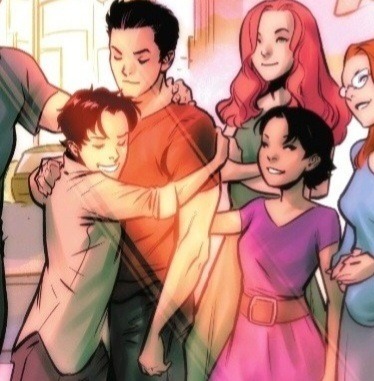
How Jason actually hugs


#dc#dc comics#comics#comic books#batman urban legends#task force z#robin 2021#media commentary#media analysis#comic panels#comic art#bruce wayne#batman#jason todd#red hood#batfamily#batfam#batkids#tim drake#red robin#stephanie brown#spoiler#batgirl#damian wayne#robin#steph brown#comic analysis#character dynamics
2K notes
·
View notes
Text
I just watched the latest episode three times in a row and I just. I need to talk about this.
More specifically, I need to talk about THIS moment:
…because this is some of the best autistic representation I’ve ever seen. I know, this is funky Star Wars animation how good can it be, but just bear with me for a minute.
When Omega asks Tech why he doesn’t act like they’re a family, he’s taken aback—he physically recoils. And then, instead of the simple, clumsy answer I expected, the writers did something I have NEVER seen before, not in a show or a movie or a game or ANYTHING.
They show him struggling to find the words. And they let him take his time to do it, because that’s what he needs.
You can see how hard he’s thinking about what to say to her. Finding the right thing to say doesn’t come easily when there isn’t technically a right answer. You can’t calculate the perfect response to a question like Omega’s, but you can try. He IS trying.
I have done this before. It sometimes takes genuine effort to phrase things the right way to not offend people, to force my tone to be acceptable, to communicate in a way that just doesn’t come naturally. I’ll sit in my therapist’s office for 3 minutes turning over a question in my head, trying out the answers until I have one that feels and sounds right. I have never seen anything like this before.
And then Tech hangs his head. It’s the weary acceptance that he’s different, and people don’t understand him, and he’s inadvertently hurt someone he cares about because he just. Doesn’t. Express himself the same way she does. But he doesn’t blame her for not understanding. When he sighs, you can tell he’s frustrated at himself.
I have felt this before. I have never felt so understood by a piece of media in my entire goddamn life.
All of this to say: I’m genuinely blown away by the nuanced understanding behind this scene. I never wanna hear that Tech is a negative stereotype of an autistic genius again—just because his autism isn’t some groundbreaking new uwu flavor doesn’t mean it’s not REAL. Ty for listening to my ramble if you got this far :))
#the bad batch#tbb#tbb tech#tbb omega#clone force 99#star wars#the bad batch spoilers#tbb spoilers#tbb season 2 spoilers#the bad batch season 2 spoilers#the bad batch season 2#cyarinka.txt#analysis
2K notes
·
View notes
Text
Alright, clearly some of you guys are just not getting it. So no more emotion from me; I am simply going to write in factual terms.
It takes a VAST amount of work to go into creating a series like Bad Batch. You have to go through writing, scene painting, 3D modeling, rigging, lighting, SFX, voice lines, editing, final production, etc; just to name a few. It takes hours upon hours upon hours of work for those animators to create all of the nuances in a scene, let alone in Bad Batch where there is an extremely high level of attention to detail. It’s not like anime where a character and background are mostly stationary while they talk. There’s constantly stuff happening in the background and they intentionally make choices that provide extremely little to the overall story and, in all honesty, take up a significant amount of their time and can be argued that they’re wasting their time and money and effort (I don’t think so, but I’m sure people could argue it if they thought that effort should be allocated elsewhere). But they do it because it provides a deeper sense of realism to the story as a whole and make it feel like a living, breathing world. For example, when a character trips a little bit or they animated them doing something slightly harder than it would have been otherwise or eyes darting around and studying someone. These are all very little things that take them hundreds of hours to get perfect. And those are the kinds of things that go unnoticed by the vast majority of people watching the show. Either because they don’t noticed the little detail that was put in at all, or they don’t understand the level of work that goes into creating little minute decisions like that. And all of those decisions that they make, both big and tiny, are given to them in specific instructions by the directors. When you think about the insane amount of work that goes into creating a show like Bad Batch, you realize that every single little detail that they choose to add in is intentional and was given to them via specific instruction. It’s not like in live-action shows where the actor can choose to make a subtle decision on the fly. There are hundreds of thousands of hours of work that go into this and every choice that they make is intentional. The lighting dept. has even confirmed this for us, saying that all of the lighting that they did was done very carefully and intentionally and to pay attention to what’s happening in the scene. Because there’s an extremely high level of detail that’s put into the show, based off of very detailed instructions that were presented to them.
Now. Taken all of these points into account, it’s critical to look at all of the little choices that were made when it comes to her character and the way that both she interacts with the world and the people around her, as well as how they, in turn, respond to her. Because, like the lighting dept. has already made very clear to us, every design choice they has been made in the creation of the show is 100% intentional. Even if that’s not something that they had said or wasn’t something you were aware of, when you focus on the aspect of animation, it’s sometimes hard to get a clear grasp on just how long it takes them to do these things. And that every little choice that they made was carried out under specific instruction. And that’s not even getting into the nuances of voice acting and understanding the subtle distinctions in the way someone talks and being able to discern the meaning behind their words based on dialect and the instructions they were given. And for someone who just casually watches the show, absolutely none of these are important. They’re watching it to watch it and no further thought is put into it. And there’s nothing wrong with that. People are allowed to watch things at a surface level and get enjoyment out of it.
For every character, they can be broken up into various parts:
•Their visual appearance
•Their behavior
•Their interactions with others and the world
•How others respond to their character
•Their small, subtle behaviors (such as a particular twitch or repetitive body movement that can be used to convey a deeper meaning)
•And their internal motives
In that order from the least to most complex. And these topics can also be used to understand the complexity of a character. For someone like Cid, all of these topics are touched on in a variety of ways.
•She’s different from them
•She’s gruff and money hungry
•She speaks to the Batch like they’re a bunch of kids and she knows better than them
•They never fully bring themselves to trust her and, at times, they see her has a burden
•Towards the end of their time together, she gets snappier, and whenever she’s around them her movements slow ever so slightly and she furrows her brows slightly a lot more than in the past
•And in the end, she betrays them
And that’s putting her character into a single sentence for every bullet point, which, for well written characters like Cid or Hemlock or Rampart or Nala Se, cuts a lot of things out.
When it comes to the way that Phee is written and what she contributes as a whole to the show, she is not a very complex character. I’m not going to go into every single scene with her, but I am going to touch on a few. And if I need to continue the discussion further to cover more scenes, then I will. On multiple instances, she puts the Batch into very dangerous situations, and overall appears to care very little for them as people unless it gets her something that she wants. This is made very evident when, for example, she gets Omega, a child, excited about a big grand adventure and Omega then convinced the Batch to go along with it. Even though they were very adamant about not doing it. This is said with both their words and their tense body language. They don’t want Omega to get hurt and they know it’s a bad idea; but in the end she’s able to convince them. Then, when they get to the site, she shows clear lack for them or their safety and proceeds to put them in a very dangerous situation where someone could have gotten seriously hurt or killed. And she shows no remorse for it. Her language, both verbal and bodily, are very loose and nonchalant, assuring them that she had everything under control and that they were able to handle it, despite their very clear frustration. This type of behavior is shown again and again and again as they continue to interact with her. Her actions relay to the viewer that she does not respect their boundaries, or arguably, them as people. Her words are designed to be rocks with a pretty bow on them. And again, this is not personal opinion or speculation. Every single word and action was carefully designed by the team. All the tensed muscles were created by a team of people working very hard to convey that to the audience. Every thinly veiled word was guided by a director when the VA came in to record the sessions. Every single choice was intentional for a very specific reason.
Tech likes things in a very specific way. He likes his ship to be in a particular order and takes very good care of its maintenance and upkeep. He prides himself on being able to maintain a good ship. He spends a lot of time on his data pad. It’s how he was designed on Kamino. That’s his link to his role in the group. He can do everything he needs to from there and, in certain scenarios throughout the show, you can see it provides him with a sense of comfort and stability. You can see this, not only in his subtle body language, but also in his fairly obvious body language with how he hunches over it. It’s reminiscent of a child hunching over a toy to bring it closer to them and protect it. It comforts him. You can also see, when he interacts with the rest of the Batch, his aversion to touch. It’s not significantly often that you see it, given that the rest of the Batch knows him better than anyone, but there are still times when physical contact or even just very close proximity happens and he either has a reaction by tensing up slightly or leaning away from it, or sometimes he doesn’t react to it at all and almost seems to not register it; such as when he’s focused on his work. Every little reaction that he has with his brothers was scripted and orchestrated for a very specific purpose. It conveys the nuances of who he is as a unique and individual person.
Keeping that in mind, when it comes to the way she interacts with Tech specifically and the Batch, it’s very clear to understand the dynamic behind them when you look close enough. To recall a few instances, there was a time when she was recounting a story about finding a big treasure and Tech says something along the lines of “she changes this story every time she tells it”. He’s conveying to both the people in the show and us as viewers that she is a liar. She is either changing the story to make herself seem cooler, or maybe it didn’t happen at all and she’s making the entire thing up. Which, I will briefly mention again, are traits synonymous with narcissists. In another instance, Tech, Omega, and Wrecker were having a conversation where Tech is reprimanding them for bringing items back from a junkyard that they were in that they thought were cool instead of what he asked them to go find and bring back for him. I’m this conversation, Phee inserts herself and tells Tech that it’s not junk; also, in that same instance, not calling him by his name, which I will get to in a minute. Tech, in that moment, is trying to work, and his conversation with the other two was interrupted and fizzles out as Omega gets excited about the idea of a treasure map. A third is when the group is on Pabu and Phee is trying to get Tech to converse with her. His body language is hunched, tense, and he averts eye contact with her. When she prods him further, he is unsure how to engage in the conversation. And when he doesn’t respond in the way that she’s wanting him to, she talks about him to the rest of the Batch as he stands there around him and says to them how he “doesn’t know how to have fun”. And then they proceed to laugh at him. And again, you can see in his body language that he is confused as to why they’re laughing at him as well as uncomfortable being in that situation. And going off of that for another small fourth instance, there is another moment when they are getting ready to leave Pabu and she approaches Tech, who is working alone and trying to avoid contact with anyone, and says to him “So you’re just going to leave without saying goodbye?” His body language immediately tenses, he hunches further in on himself around his datapad, and his words make it clear he is both unsure and unwanting of the conversation. And when he does not respond in the way that she wants him to, she moves the datapad away from him to make him focus on her. She removes the item that brings him the most security to force him into engaging in a conversation he is uncomfortable with having. And again, these are all very intentional choices. They are not left up for interpretation. They are there to tell us what the character is feeling in that moment. They are trying to convey to us that he is uncomfortable. Not that he’s shy around a girl he thinks is pretty. And given on other scenarios that have happened throughout the show, it’s very clear that interpersonal relationships with anyone outside of Omega and the Batch is not something that he’s interested in. If they wanted to convey that he found her attractive, there are routes they could have taken to ensure that that comes across correctly to the audience, such as a faint little blush or rubbing a hand through his hair. But they didn’t do that, and instead chose for him to shy away and hide from certain situations or tense up and keep his head down in others. They are conveying to us that he does not like being around her. Because every single action they made him carry out took hundreds of hours of work to execute, and they would not go through all that trouble for no reason.
Branching off of that, we reach the topic of Tech’s name. When you watch the series as a whole, you can count on one hand the number of times that Phee refers to Tech by his actual name, while she refers to the others as their actual names. This is different from Cid in the way that Cid made that intentional choice to call them different things as a way to maintain distance from them. It’s clear from both her body language and her words that she did not want to get close to them. And really, wanted nothing to do with them unless they made her money. These are intentional choices. Phee’s character is designed to be flighty and unbothered. And she wants what she wants when she wants it. The choice to call Tech names and refer to everyone else by their names is an intentional choice. Him not understanding why she does that is an intentional choice. She does not respect him, which is why she does this. She can see that he doesn’t know what to do about it, so she keeps doing it. Like when a person presses on a bruise. These are all intentional choices made by the directors.
There was also a comment that said she behaves exactly like Crosshair does. And there are a few things I think did not entirely process when they made that comment. The first being that Crosshair was written to be one of the main antagonists for the first two season. I know they appeared in Clone Wars as well, but I’m talking specifically about Bad Batch. He was designed to be a bad guy that goes through a redemption arc; just like Zuko did in ATLA, for those who enjoy it. They both started out as antagonists, had horrible things happen to them, realized along their journey that maybe they were wrong, and are able to redeem themselves in the end and side with, or in Cross’ case, return to, the protagonists. In the beginning Cross was very sharp and defensive and thought he knew what was best. But he grew over time and learned how to care for people and share his weaknesses instead of putting on a facade all the time. And that’s the difference. We are reaching the end of the series and Phee has never had character growth to the level that Crosshair has and softens and opens up to the rest of the group. She hasn’t had any character growth at all. She is still the same exact person she was when we met her. There have been characters who have appeared for significantly less time that her, and if you pay attention to them, they have had significantly more growth than her as well.
The problem that I have begun to notice with people who are so quick to defend her actions is that they seem to be focusing more on her than on anything else. When you focus on just her, I can see how someone could mistake these interactions for being positive. Because all they’re focusing on is someone who’s having fun, and of course that would translate to something positive for him. But for the people who focus on Tech, it becomes very evident that these interactions are not positive. When you watch Tech, and I mean actually pay attention to him and not just watch him, you see all the subtle signs that you would otherwise miss. Him being annoyed and uncomfortable and confused and tired and generally not enjoying being around her. And this, unfortunately, happens a lot in real life too. People don’t take the time to absorb both sides of what’s happening. And since we as humans are quicker to pick up on people who are happy as opposed to people who are not, it’s so easy to miss the signals and just assume that what you’re watching is a happy interaction and put forth no further effort into making sure that’s actually what’s happening.
There is no other way to say that these things are all intentional. They wrote, designed, and sent out something that they have spent the past few years creating. When you understand the level of work that was put into it all, there are a lot of things that become very clear. And sure, headcanons exist and people can speculate what happens between the episodes. But headcanons can only go so far before it becomes ridiculous. We cannot confirm that Echo didn’t run off to go have a quiet life with Cid, but that doesn’t automatically mean that it’s true. Inferring things that are not within the realm of possibility is not conducive. Assuming that Phee spent a lot of time talking about her adventures that she may or may not have had with the Batch between the episodes? That’s conducive and we have clear evidence that would support that. Assuming that her and Tech had a very close relationship and she always listens to what he had to say between episodes? As much as some people want it to be true, it’s just not. There is no evidence that supports that line of thinking, and, in fact, there is a vast amount of evidence that would actually conform the opposite; such as Phee talking over everyone and commanding the conversation, not respecting things that Tech says, etc.
I’m going to wrap this up by talking a bit more personally now. There are plenty of people assuming that I’m a racist or a misogynist or that my literacy skills are lacking or whatever, but because you’re upset that someone is calling out the awful behavior of someone you like doesn’t make it any less true. And that applies to both this type of situation and in real life. I know who I am and what I stand for, and you trying to tell me that I’m otherwise changes nothing. And defaulting to assumptions like that shows that either you do not watch the show with a more attentive eye, or that’s all that you see Phee for. A black woman. Both of which are issues.
People are allowed to not like black characters, even if they are black.
People are allowed to not like Asian characters, even if they are Asian.
People are allowed to not like female characters, even if they’re women (or AFAB people).
People are allowed to not like LGBTQ characters, even if they are queer.
People are allowed to not like neurodivergent characters, even if they are neurodivergent.
People are allowed to not like characters that display particular traits or thought processes, even if they share those same traits or thought processes.
People are allowed to not like characters if they think that the character is bad.
Also, for the people saying I’m using my autism as a shield clearly don’t understand how autism works? I don’t say that to be an excuse. I say that to provide context and reasoning behind the things that I say. Like many other neurodivergent people do. You all are getting pressed about the wrong things. If you want to debate the time and study I’ve put into the show because I genuinely enjoy it, then be my guest. But don’t throw out petty insults and waste everyone’s time. At least put forth some more critical thinking behind it and try to figure out why someone could be saying the things that they’re saying
#phee is a bad character#you can try to argue all you want but that doesn’t make it any less true#she’s not good for them#you can try to insult me but it’s not going to work#try using some critical thinking#I’ll wait#I know you’re going to try to argue with fact#I’m not going to sit around and let a bad person be praised for the bad things they’re doing#this is not an opinion#formal analysis#critical thinking#star wars#the bad batch#tbb#tbb season 3#bad batch#the bad batch season 3#tech and phee#tech x phee#the bad batch phee#phee genoa#tbb phee#tech bad batch#clone trooper tech#tbb tech#tech#technology#technically#ct 9902#clone force 99
178 notes
·
View notes
Text
It took 2 people to fully convince Crosshair to do a 180 on the Empire - but neither of those people were Bad Batch members.
They couldn't be. What would a squad of defective clones who had been disobeying orders since day 1 know about loyalty to an institution determined to establish order for the good of the galaxy? What would they know about finding purpose in being "good soldiers"?
Now, I DO think the seeds of Crosshair's eventual defection were planted by his brothers. Hunter pointing out that "Blind allegiance makes you a pawn" and then telling Crosshair "All you'll ever be to them is a number" are statements that are proven later to be true. But it takes Cody and Mayday to drive the lessons home.
Cody and Mayday share several characteristics that place them in unique positions to influence Crosshair:
Both are regs who accepted and befriended Crosshair - Cody says he specifically asked for Crosshair for the mission, and Mayday is upfront and friendly to Crosshair right from the start. (Contrast this to the other regs getting up to move tables when Crosshair sits to eat, or the other clone troopers who walk past Crosshair to get onto the shuttle without even sparing him a glance.)
Both are commanders. (I believe Crosshair ultimately respects authority for the most part: even when he was arguing with and challenging Hunter in "Aftermath," he still deferred to Hunter's orders until his inhibitor chip was intensified and he was then promoted to commander.)
Both are loyal soldiers who have served the Empire well - again, these regs are still commanders even under the new government. And we all know how important loyalty to the Empire is to Crosshair at this point.
Both save Crosshair's life during their missions.
In short, both are regs, but they are still soldiers Crosshair can quickly identify with and trust.
I think it's key that Crosshair encountered Cody before Mayday, though. And despite their similarities, both soldiers drive home different points.
CODY
Cody is one of the few regs we know Crosshair already respected - and still respects, given that Crosshair almost smiles when he recognizes him.
(Some proof in case it isn't apparent: Crosshair goes from frowny face...
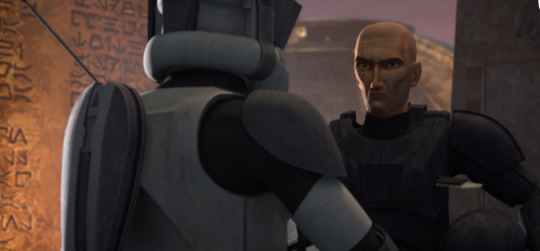
...to relaxed almost-happy-if-you-squint-just-right face)
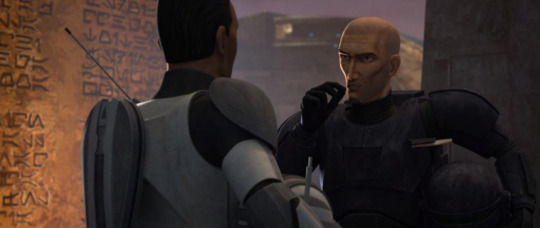
Anyway, while Cody does drop some hints early on that he has doubts about the Empire, he is willing to carry out the mission to rescue "Governor" Grotton, showing he will follow orders to a certain extent. However, he shows more restraint than Crosshair might have: he doesn't attack the civilians despite their obvious mistrust of the soldiers, he comes to an understanding with Tawni Ames, he's NOT willing to follow an order to execute her, and he is clearly dismayed and disappointed by her death.
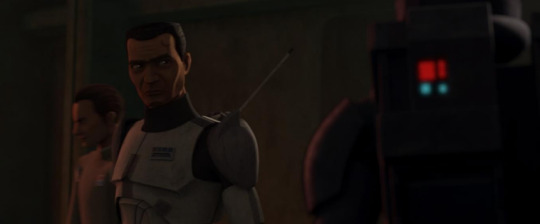
And so, at the end of a "successful" mission, Cody more plainly reveals the depth of his dissatisfaction with following orders against one's own moral scruples:

Hunter had said "Blind allegiance makes you a pawn." And Cody, unwilling to blindly and unquestioningly be a pawn - or act like a battle droid - any longer, goes AWOL.
But that lesson alone isn't enough to make Crosshair turn on the Empire. Instead, he needs Mayday to give him the final push.
MAYDAY
First, Mayday indicates how appalled he is by the idea of anyone leaving their own behind - which we know is a sore spot for Crosshair. But most importantly, Mayday has demonstrated since he was first introduced that he strongly believes in soldiers being loyal to and looking out for each other (which is far different than just being loyal to the Empire).

Second, Mayday unknowingly challenges Crosshair's belief that serving the Empire provides meaningful purpose. (Remember that one of Crosshair's main arguments to his brothers about joining the Empire was so they could "find purpose again.")


Then, he unwittingly goes for the jugular and rips apart the motto Crosshair had adopted.
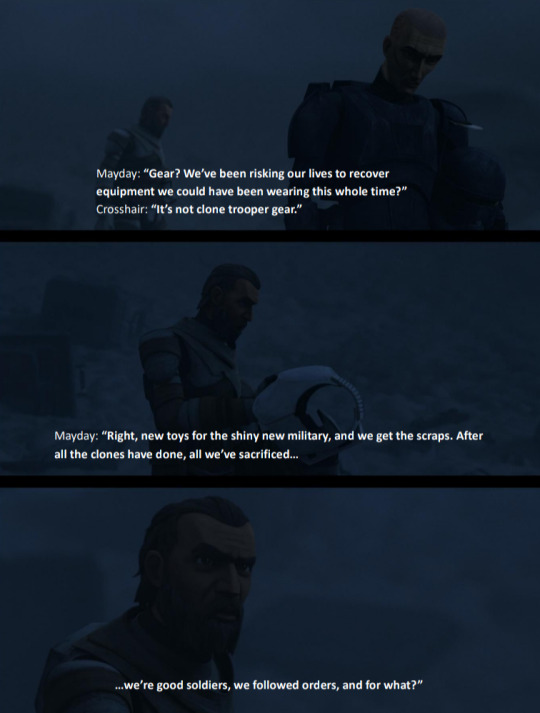
And then, in case Crosshair has any lingering doubts about the answer to Mayday's rhetorical question, Nolan decidedly answers the question for him.

Hunter had said "All you'll ever be to them is a number," and he is proven right in the most heartbreaking way.
Crosshair had accused his brothers of not being loyal to him; unfortunately, now he sees what true disloyalty looks like. And for Crosshair - severe and unyielding - realizing that he has misplaced his loyalty by giving it to an entity that mocks him and casts him AND those he cares about aside for doing so... this is the final straw.
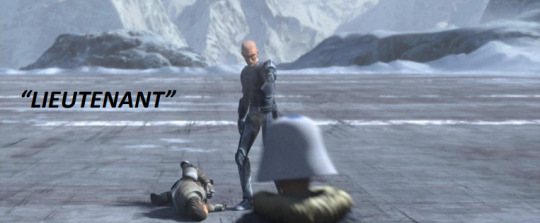
Thankfully, Crosshair has now rediscovered the people who are worthy of his loyalty.
#the bad batch#tbb#clone force 99#star wars#star wars the bad batch#tbb crosshair#commander mayday#tbb mayday#commander cody#tbb cody#lessons learned the hard way#tbb analysis#and now i'm crying#shouldn't have rewatched these episodes#but they are SOOO GOOD#save crosshair#amazing character development in only two episodes#this is longer than i intended it to be - again#but this is what happens when i have to wait four more days for the finale
166 notes
·
View notes